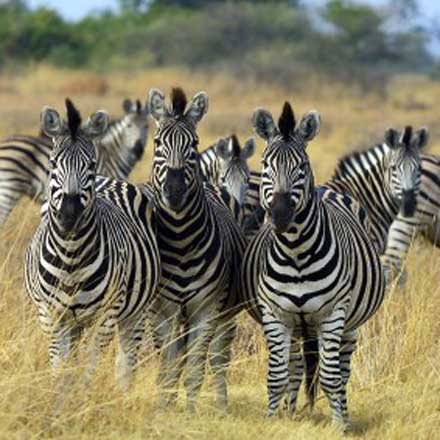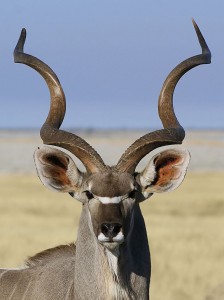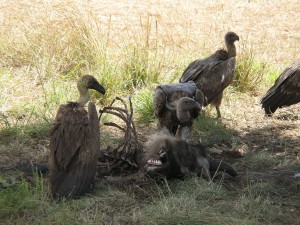
The almost three months I was able to hunt on and off in Zimbabwe were some of the best and hardest times I ever experienced while hunting. My emotions ran the full range, from ecstatic to deeply sad. At times, the tough choice was determining which animal in the herd I wanted to take. While on other occasions, after days of hard hunting, I would’ve been happy to just see one shootable animal.
The greatest conflict in my mind by far, was the void between the people who have, and those who have nothing. I’d never been to a third world country before, so initially when I landed in the capital city of Harare, my initial impression was that it was very similar to many medium-large cities in the US. One day, when taking a different route to work, my initial mindset was radically altered.
Normally I ride the large company bus, very similar to a Greyhound-type long distance transporter, with individual bucket seats. We would always go south for a while, then maybe eight miles out, turn west, and stay on that highway all the way to the mine. Occasionally, when I would take my company car in, I would also take the same path, not wanting to get lost by trying another route.
Early on in my stay while riding the bus out to the mine, and a short while after we had left the parking lot, a co-worked pointed to a side road on the right, and said I could also turn there, head west for about 10 miles, then turn south for about 4 miles, which would put me on the highway that heads west to the mine. He said it was a pretty ride, and would avoid a lot of the slow city traffic. I thanked him and made a mental note to give that a try the next time I took the company car.
The next week, I had a meeting in town and had to drive the car out to the mine in the morning. Remembering what my friend had said about the “country route,” I turned west onto the two lane road to give it a try. Within only 3 or 4 miles, the “city” ceased to exist, and I was looking at only grass and trees on both sides of the road with houses getting farther and farther apart. During the time, the road went from having curbs and being properly paved, to only a single lane of asphalt that seemed it had just been laid right on top of the soil.
Suddenly, off to my right, an area on a hillside opened up. A 5 acre parcel of short, green grass was fenced in all around with a large plantation-style white mansion at the top of a slight hill towards the...
very back. Amazingly, a dozen or so zebra were grazing peacefully on the bright green, grassy hillside in front of the mansion! The owner obviously liked zebra so much that he fenced in the large area.

This allowed him to keep his herd in the front yard so they could be admired! I braked and sat for a while, taking in the sight of black and white stripped zebras grazing peacefully on a manicured green hillside. I was not just outside any US-like city anymore!
A few more miles down the single lane road, and the native wild grass was growing right up to the shoulder of the road to a height of over six-feet tall. I felt like I was driving down a channel of golden brown grass. There were no more houses of any kind down that road until I reached a point where the only choice was to turn south onto the short leg to the main highway, well out of the city. Barely a mile or two down that road and a sight to my right caused me to brake to a crawl.
It’s 1996, and sitting in my new gold, luxury edition Toyota Camry, I saw, barely 50 feet off the road, a small village of twenty or so huts. They were small, rectangular houses, perhaps 20 feet long and ten feet wide. They appeared to have walls made of mud. The roofs were corrugated metal. There were window openings, but no windows. There was an opening for a front door,… but no door hung in that opening.
I saw young children from the ages of one to three years old, walking completely naked and barefoot around and between the huts. Older children had some clothes, but they were hardly more than rags. And yet, they appeared happy and content, laughing and playing like young children do. I saw a few adults, they too are shoeless, and their clothes were in a similar condition.
I was overcome with sorrow and guilt. As one of those who “have,” I had just seen the “have- nots” and was deeply saddened. Some start to look at the fancy car, and feeling like I had invaded their privacy, I let off the brake and continued down the narrow road, reaching the highway in just a few minutes. Weeks later, I still couldn’t get what I had seen down that narrow road, out of my mind.
Each time I went hunting, the trackers always ate what is...
called sadza (sud-za) for breakfast and dinner. I also came to find out that when at home, they had the same thing for lunch. The vast majority of natives in Zimbabwe buy 25 lb. sacks of ground maize, or corn, as the primary food they eat three times a day. A pot of water is brought to a boil. The cloth bag is untied, and handfuls of the ground corn are tossed into the pot. It is left to simmer for several minutes, until it’s the consistency of very dry oatmeal or grits..
They then reach in and take out a small portion, rolling it between their hands into a lump about the size of a golf ball, then they start to eat it. This is repeated several times until they have had their share. This is what they eat for breakfast, lunch, and dinner. They rarely eat meat as they can’t possibly afford it.
Several weeks later, while on a paid hunt, I managed to take a very nice kudu bull, about the size of a cow elk. I knew the PH keeps the carcass to sell the meat, but explained that I wanted to do something with it this one time, and offered to give him more money so that I could take it with me. He refused any money and let me go, having his trackers place the skinned animal in the trunk of my Toyota on a large plastic sheet..
On the way home, I drove down the one-lane road to the little village that has haunted my mind for weeks. Pulling up in front of it in my fancy car, there again are people walking here and there between the huts. I popped the trunk release and got out, opening the lid up to reveal the large carcass. I started waving to the elders to come to me. I speak no Shona, only English, which I am sure they don’t understand.

A few come slowly to me, and I tried as best I could to convey the message that I had brought meat for the village to share. It took a while. They seemed suspicious at first, until I cut off a family-sized portion from the hindquarter and held it out, offering it to a very old woman. Finally, my message is understood, and there were excited yells of joy, as she shouted something in Shona. The village erupted in excitement. Soon there was a long string of people coming with bowls, plates, baskets,...
and cans, standing before me, awaiting their portion. I started cutting as fast as I could, trying to give each person around a two pound section of meat.
The men and women were joyful. Their eyes shone brightly with happiness, their teeth flashing from ear to ear. I’m certain it had been months, or years, since any of them had any meat. One by one they eagerly stood before me, holding out what they brought from their huts to carry back this great blessing. As each person received their precious meat, they thanked me over and over. I just smiled and nodded, then dug back into my trunk to cut off a portion for the next person. In less than 15 minutes, it looked as if vultures had stripped the carcass of all meat, leaving only the bones
“They can make soup from the bones!” I thought to myself, so then I started to break apart the remaining skeleton, giving each person enough to make some soup with, since a fair amount of meat clings to each rib, backbone, shoulder, and leg bone. In another ten minutes, I stood looking into my trunk at a bloody plastic sheet. The entire kudu has been cut into pieces and given to the village, bones and all.
Before me stood twenty five to thirty elders, men and women, proudly holding their portion of the animal whose life I had taken just earlier that day. I can’t possibly imagine the level of excitement that evening in the village as every family was able to cook meat for dinner. It would have been amazing to be a little mouse and be able to understand what was spoken.
Never before had I ever felt so happy as when I stood before the village of joyous eyes. While I didn’t understand the words each of them said, the meaning of their words was clear. I deeply felt their sincere appreciation for the man who came by and shared his harvest with the forgotten village off the lonely road.
As I got back in my car and drove off, I realized that I could never again come close to feeling the joy inside that I did at that very moment. As a human being, it was the happiest moment ever in my life.